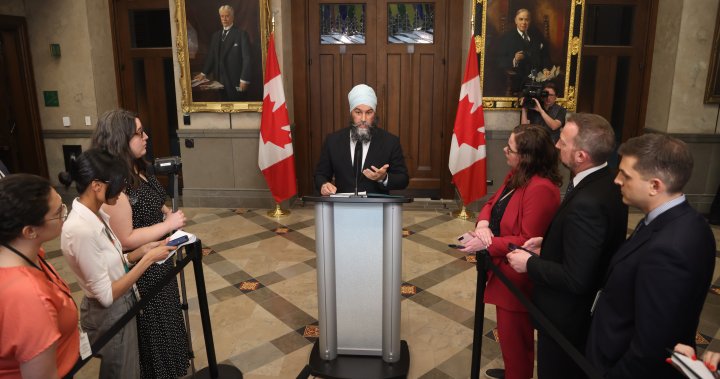NDP Leader Jagmeet Singh has accused parliamentarians who allegedly collaborated with foreign governments of being “traitors to the country.” Singh made these comments after reviewing the unredacted version of a report from the National Security and Intelligence Committee of Parliamentarians (NSICOP) that was released recently. He stated that some MPs knowingly provided assistance to foreign governments, which ultimately harmed Canada and Canadians. Singh labeled their actions as unethical and, in some cases, illegal or criminal, leading him to agree with the finding that these individuals are traitors to the country.
Singh’s remarks contrast with Green Party Leader Elizabeth May’s response after reading the full NSICOP report. May, who also has security clearance to review the material, expressed relief and downplayed the significance of the report, describing the media frenzy surrounding it as exaggerated. In contrast, Singh indicated that he is more concerned after reading the full text, emphasizing the gravity of the situation. He did not directly challenge May’s assessment but criticized both Prime Minister Justin Trudeau and Conservative Leader Pierre Poilievre for their handling of the issue.
May had previously assured reporters that she had no concerns about disloyalty among MPs in the House of Commons, indicating that there was no list of individuals who had shown disloyalty to Canada. Singh refrained from directly contesting May’s statement, instead shifting blame to Trudeau and Poilievre for their leadership failures in addressing the situation. Singh expressed his dismay over the lack of action taken by the prime minister and the Conservative leader in response to the report, highlighting what he perceived as a failure of leadership on their part.
Despite the gravity of the accusations made by Singh and the content of the NSICOP report, Public Safety Minister Dominic LeBlanc has refused to disclose the identities of the parliamentarians who allegedly collaborated with foreign governments. LeBlanc cited Canada’s official secrets act as the reason for withholding this information, suggesting that revealing their identities could be a breach of the law and pose a potential risk to national security. This decision has raised further concerns and questions about the transparency and accountability of parliamentarians in their dealings with foreign entities.
In conclusion, the revelations in the unredacted NSICOP report have sparked controversy and allegations of disloyalty among some parliamentarians. Singh’s strong condemnation of MPs who collaborated with foreign governments reflects his serious concerns about the issue. The contrast in responses between Singh and May underscores differing perspectives on the severity of the situation. The reluctance of government officials to reveal the names of the implicated individuals has added to the uncertainty and speculation surrounding the matter, raising questions about accountability and transparency in Canadian politics. The implications of this report and the reactions of political leaders highlight the complexities and challenges of maintaining national security and integrity in democratic governance.













